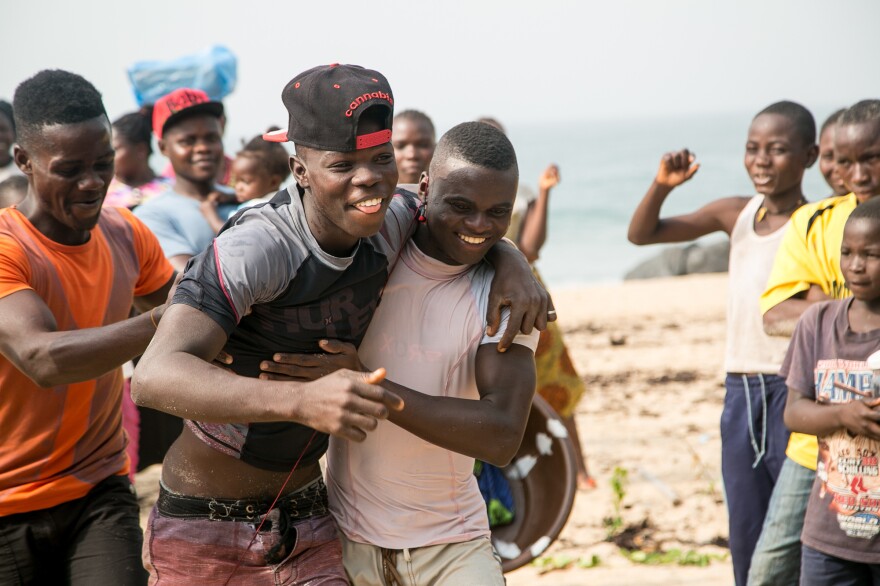"Wait for the next one!" a teenager yells, perched on a shaded rock with a group of his friends.
"That's it, that's it!" cries another, gesturing toward a swelling wave that's gathering speed as it heads toward a surfer about 25 yards offshore. When he lets the wave pass him by, bobbing over its crest on a scuffed board, the group laughs. "Look at him, he's scared."
It's a hot Saturday afternoon in Robertsport, a sleepy fishing town a few hours' drive up the coast from Monrovia, Liberia, and the boys are watching their peers compete in the town's annual surfing championship. About 50 locals have shown up to watch the show. When the surfer finally finds a wave he likes and rides it along the coastline, the crowd cheers and throws sand in the air.

It's a far cry from a year ago, when the Ebola crisis brought the country to a near standstill. By last January, Ebola cases in Monrovia had begun to fall, but the area around Robertsport had become the site of a renewed outbreak. The surfing competition was canceled for the first time in five years.
A few of the surfers competing in this competition, held on Jan. 30, had to be quarantined when a member of their household fell ill with the virus. Thankfully, none of them caught the disease, and the family member made a full recovery.
"Ebola isn't around, so we aren't all panicking here anymore," says Peter Swenn Jr., the winner of the 2014 "senior' category," who's in his late 20s.
In between "heats" — 20-minute runs where three surfers compete to ride the longest wave as stylishly as they can — poppy Afrobeats music plays from speakers on the beach as people gather to hear who advanced to the finals. Those too young to surf are wrestling in the sand and running behind the older boys on their way into the water.
Surfing first arrived in Robertsport via white Land Cruisers emblazoned with aid organization logos. The aid workers would hit the waves while local kids hung out on the beach and watched. The beach is known as one of the best in the region for surfing, and eventually the foreigners started taking the kids out in the water.
After a photographer from San Diego opened a surf lodge in Robertsport and started lending his spare boards to the aspiring local surfers, they were in the water constantly. For Liberians who don't have access to much cash, surfing is the perfect sport. All you need is a board and the right wave.
With the singlemindedness bordering on obsession that kids across the world devote to sport, the fledgling surfers were, in a few short years, eager to compete against each other.
Kent Bubbs, an American aid worker volunteering as a judge for this year's competition, watched as the sport caught on in Robertsport. "When I first started surfing here nine years ago, there was one [Liberian] surfer. That turned into two, and now there's over a dozen. In today's competition we have 18."
One is Elijah Brown, a popular 19-year-old with a streak of orange dye in his hair. He won 2014's "junior" category. When he surfs, people on the beach yell, "Bravo! Bravo!" — a reference to his favorite soccer player, Claudio Bravo, the goalkeeper for FC Barcelona.
Brown got his start when an aid worker gave him a lesson and promised to buy him a board if he kept at it. The worker followed through on the promise, and Brown came down to the beach every day to practice.
"I have a lot of style," Brown says. "Whenever I see girls on the beach I go in the water." In the last competition, held before the Ebola outbreak in early 2014, he won by pulling off a "lean-back," where the surfer looks as if he's going to fall, then steadies himself.
"I have to battle my friends before I become the winner," he says, smiling. "I'm sure that I can make it."
The boys are competitive — everyone wants to win — but they're also friends. When one of them wins his heat, the others lift him up and carry him down the beach, cheering.
"This is the first year that the competition's been 100 percent organized by Liberians," says Bubbs. "It's a big milestone."
At the end of the final heat, a man in his early 20s blows a whistle and waves a red flag. The crowd gathers in a shaded area, awaiting the results.
One of the judges makes his announcement: Elijah has won the "junior" category again, and Benjamin McCrumade the "senior." Their friends embrace the two winners as the crowd applauds and music floods the beach.

The celebration is a welcome sight. Scars from the outbreak remain, but like the waves being drawn back into the sea, Ebola has receded from Liberia.
"We can't let people say, 'Oh, y'all got good waves in Liberia but you don't surf them,' " McCrumade says. "I'm going to surf and enjoy my waves because it's my country's nature. That's what I love about surfing."
Copyright 2021 NPR. To see more, visit https://www.npr.org. 9(MDAxODg3MTg0MDEyMTg2NTY3OTI5YTI3ZA004))



